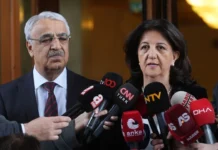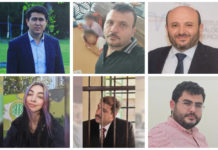A Turkish court has begun to hear the retrial of four rights activists after Turkey’s Supreme Court of Appeals overturned their July 2020 convictions on terrorism-related charges, Turkish Minute reported, citing the Diken news website.
Eleven human rights defenders, including refugee rights lawyer and honorary chair of Amnesty International’s Turkey section Taner Kılıç, were accused of terrorism for attending a meeting on İstanbul’s Büyükada island in 2017. They were targeted by President Recep Tayyip Erdoğan, who alleged that the meeting’s agenda was to plan the continuation of a coup attempt against his government on July 15, 2016.
The İstanbul 35th High Criminal Court sentenced Kılıç to more than six years in prison on charges of “membership in a terrorist organization” and convicted rights activists Özlem Dalkıran, İdil Eser and Günal Kurşun for knowingly and willingly supporting such an organization, sentencing each to 25 months in prison, while acquitting the remaining seven human rights defenders.
The third chamber of the Supreme Court of Appeals overturned the convictions in November, saying Dalkıran, Eser and Kurşun should be acquitted. Kılıç’s case was quashed on the grounds of an “incomplete investigation” and referred back to the first instance court.
According to Diken, the İstanbul court on Wednesday said it had complied with the top court’s decision to overturn the convictions, adding that it ruled for the continuation of a travel ban previously imposed on Kılıç while an investigation to determine whether he used the ByLock mobile application was being conducted.
ByLock is believed by the Turkish authorities to be a secret communication tool among the members of the Gülen movement, a faith-based group inspired by Turkish cleric Fethullah Gülen that Erdoğan blames for the attempted coup in 2016.
In his defense, Kurşun, who faced terrorism charges for writing for the now-closed Today’s Zaman daily due to its affiliation with the Gülen movement, said he wrote for the daily at the same time as some Erdoğan aides such as İbrahim Kalın and late Beril Dedeoğlu.
He said neither Kalın nor Dedeoğlu faced any charges for contributing to a Gülen-linked daily.
The next hearing of the case is scheduled for June 6, Diken said.
Kılıç was charged with links to the Gülen movement over claims that ByLock was downloaded to his phone in August 2014.
Erdoğan has been targeting followers of the Gülen movement since the corruption investigations of December 17-25, 2013, which implicated then-prime minister Erdoğan, his family members and his inner circle.
Dismissing the investigations as a Gülenist coup and conspiracy against his government, Erdoğan designated the movement as a terrorist organization and began to target its members. He locked up thousands including many prosecutors, judges and police officers involved in the investigation as well as journalists who reported on them.
Erdoğan intensified the crackdown on the movement following the coup attempt. Gülen and the movement strongly deny involvement in the abortive putsch or any terrorist activity.















